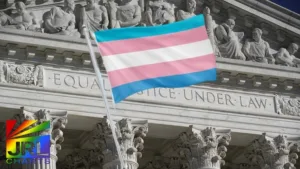WASHINGTON, D.C — (05-27-19) — SCOTUS has snubbed the famous Transgender School Bathroom Policy case on Tuesday, making the U.S. 3rd Circuit Court of Appeals ruling stand.
The case challenging a Pennsylvania school district’s bathroom policy allowing transgender students to use bathrooms of their choice, was brought by the conservative Alliance Defending Freedom.
The anti-LGBTQ organization says it was representing a group of students in the case, Doe v. Boyertown Area School District, saying that the school district’s transgender policy violated student’s privacy rights.
The Alliance Defending Freedom has represented students and school districts in similar lawsuits across the country.
Supreme Court Refuses to Hear Transgender School Bathroom Policy, Leaving U.S. 3rd Circuit Court of Appeals Unanimous Ruling Stand
The Supreme Court’s decision on Tuesday, leaves standing the U.S. 3rd Circuit Court of Appeals unanimous ruling. The ruling says that the Pennsylvania school district can continue allowing transgender students to use bathrooms that align with their gender identity.
However, the court later revised its ruling, toning down language that said “Federal law protects this particular transgender right.
The ACLU represents Aidan DeStefano, a transgender student at Boyertown Area Senior High and the Pennsylvania Youth Congress, a coalition of LGBTQ youth leaders and youth organizations.
Following the SCOTUS ruling on Tuesdsay, the ACLU tweeted:
Trans students are not a threat. This move means school districts can continue to allow trans students to participate in school activities, and use restrooms and locker rooms, that match their gender.
— ACLU (@ACLU) May 28, 2019
Needless to say Senior Counsel and Vice President of Appellate Advocacy John Bursch, was disappointed by the Supreme Court’s decision not to hear the case.
“Students struggling with their beliefs about gender need compassionate support,” said Bursch. “But sound reasons based on common sense have always existed for schools to separate male and female teenagers in showers, restrooms, and locker rooms,” said Bursch.
Bursch further added that he hopes the Supreme Court will take up a similar case in the future “to bring much needed clarity to how the lower courts should handle violations of well-established student privacy rights.” said Bursch.
Article by: Paul Goldberg, Staff Writer
- LGBTQ Corporate Participation Plunges 65% in 2026 as DEI Retreat Reshapes Business Landscape - February 22, 2026
- Forbidden Fruits (2026) Ignites Buzz With Sapphic Undertones and Witchy Mall Cult Drama - February 21, 2026
- Trump Targets Netflix Board Member Susan Rice After ‘Take a Knee’ Remarks Spark Political Firestorm - February 21, 2026
// Affiliate Disclosure: JRL CHARTS is a digital news and media platform. We do not host, stream, or sell adult content. Some outbound links may contain affiliate tracking to licensed studio-owned platforms (e.g., LatinBoyz, AEBN, BiLatin Men). These links lead to legal, age-gated distributors and are provided strictly for editorial and informational purposes only.







